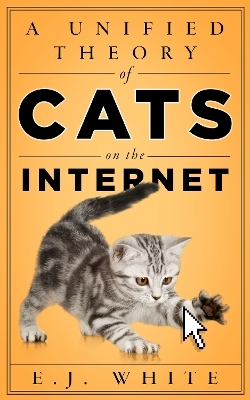
A Unified Theory of Cats on the Internet
Stanford Briefs (Verlag)
978-1-5036-0463-6 (ISBN)
The advertising slogan of the social news site Reddit is "Come for the cats. Stay for the empathy." Journalists and their readers seem to need no explanation for the line, "The internet is made of cats." Everyone understands the joke, but few know how it started. A Unified Theory of Cats on the Internet is the first book to explore the history of how the cat became the internet's best friend.
Internet cats can differ in dramatic ways, from the goth cats of Twitter to the glamourpusses of Instagram to the giddy, nonsensical silliness of Nyan Cat. But they all share common traits and values. Bringing together fun anecdotes, thoughtful analyses, and hidden histories of the communities that built the internet, Elyse White shows how japonisme, punk culture, cute culture, and the battle among different communities for the soul of the internet informed the sensibility of online felines. Internet cats offer a playful—and useful—way to understand how culture shapes and is shaped by technology.
Western culture has used cats for centuries as symbols of darkness, pathos, and alienation, and the communities that helped build the internet explicitly constructed themselves as outsiders, with snark and alienation at the core of their identity. Thus cats became the sine qua non of cultural literacy for the Extremely Online, not to mention an everyday medium of expression for the rest of us. Whatever direction the internet takes next, the "series of tubes" is likely to remain cat-shaped.
Elyse White is Associate Professor of Digital Humanities at Stony Brook University, and the author of The Republic of Games (2018) and You Talkin' to Me? The Unruly History of New York English (2020). A self-professed dog person, she's now the human associate of Aaron Purr and multiple foster kittens.
Contents and AbstractsIntroduction: Introduction chapter abstractThis chapter establishes the terms of the mystery that the rest of the book explores: how and why the world came to believe that cats are the "spirit animal" of the internet. While the triumph of cats on the internet is a measurable fact, it is also a myth: a signifier that carries remarkable force in the marketplace of attention. Cats are a symbol of pointless online sociability; so the reason that we needed a symbol of pointless online sociability—that its prevalence came as a surprise to all who had "for so long heard about the coldness and impersonality of the computer"—is worth keeping in mind. Astonishing to early observers of computing, pointless online sociability became a major force driving the development of the internet: not an epiphenomenon, but a root cause.
1The Semiotic History of Grumpy Cats chapter abstractThis chapter examines the long history of making cats suffer as a form of entertainment. We no longer massacre cats for fun, but even today, the torment of cats in fiction is acceptable sport.
2The Great LOLcat Massacre chapter abstractOne of the first recorded instances of mass trolling on the internet was an attack on a forum for cat lovers whose regulars were mostly women. That the women of the cat lovers' forum could seem like outsiders to be pushed from the internet was the outcome of a long semiotic and cultural history that demonized cats, as well as a complex series of gender reversals in the history of computing.
3Extremely Online Felines chapter abstractThis chapter explores the significance of cats in the subcultures that helped to set down the social protocols of Web 2.0. The communities that laid the social foundations of the meme culture saw themselves as inhabitants of the periphery as opposed to the mainstream; the ascendance of the cat as the mascot of the internet relied on a view of the internet as a snarky, alienated alternative to the mainstream. These communities included many Americans who were fascinated with Japanese culture, which further drove the popularity of cat memes on their boards; meme culture has deep roots in japonisme.
4The Three Lives of Internet Cats chapter abstractThe history of internet cats can be divided into three periods: the webcam and personal blog era; the meme era; and the celebrity cat era. The rise of celebrity cats answers a question about internet economics that economists and media theorists have been debating for decades: whether the internet will flatten the playing field so that a few superstars no longer reap most of the consumer demand in a given area. As it turns out—and as Anita Elberse shows—in the digital marketplace, superstars are more important than ever: although the long tail is lengthening, in the sense that unpopular items are finding buyers, superstars are gaining a larger proportion of total sales.
Epilogue: Late Adopter chapter abstractWhen I started work on this book, I was Not a Cat Person. But I try to be thorough, so once research was underway, I reached out to a shelter in Brooklyn and asked to foster a kitten. Reader, I kept him. It's humbling to like a cat after complaining so much about them. I'll go further and say, since my dog can't read, that I'm probably a cat person. Having been reminded so pointedly that I can't predict the turns in my own life, I should refrain, I think, from pretending that I can say much about the future of the internet. Yet we can likely be confident that whatever turns the internet takes, the tubes will remain cat-shaped: frivolous, subversive, cute, mean, and weird, with communities of users fighting endless battles over the imaginary heart of the web, and with play and politics in perpetual mutual reinforcement.
| Erscheinungsdatum | 14.07.2020 |
|---|---|
| Sprache | englisch |
| Maße | 127 x 203 mm |
| Themenwelt | Geisteswissenschaften ► Geschichte ► Allgemeine Geschichte |
| Mathematik / Informatik ► Informatik | |
| Sozialwissenschaften | |
| ISBN-10 | 1-5036-0463-2 / 1503604632 |
| ISBN-13 | 978-1-5036-0463-6 / 9781503604636 |
| Zustand | Neuware |
| Haben Sie eine Frage zum Produkt? |
aus dem Bereich


